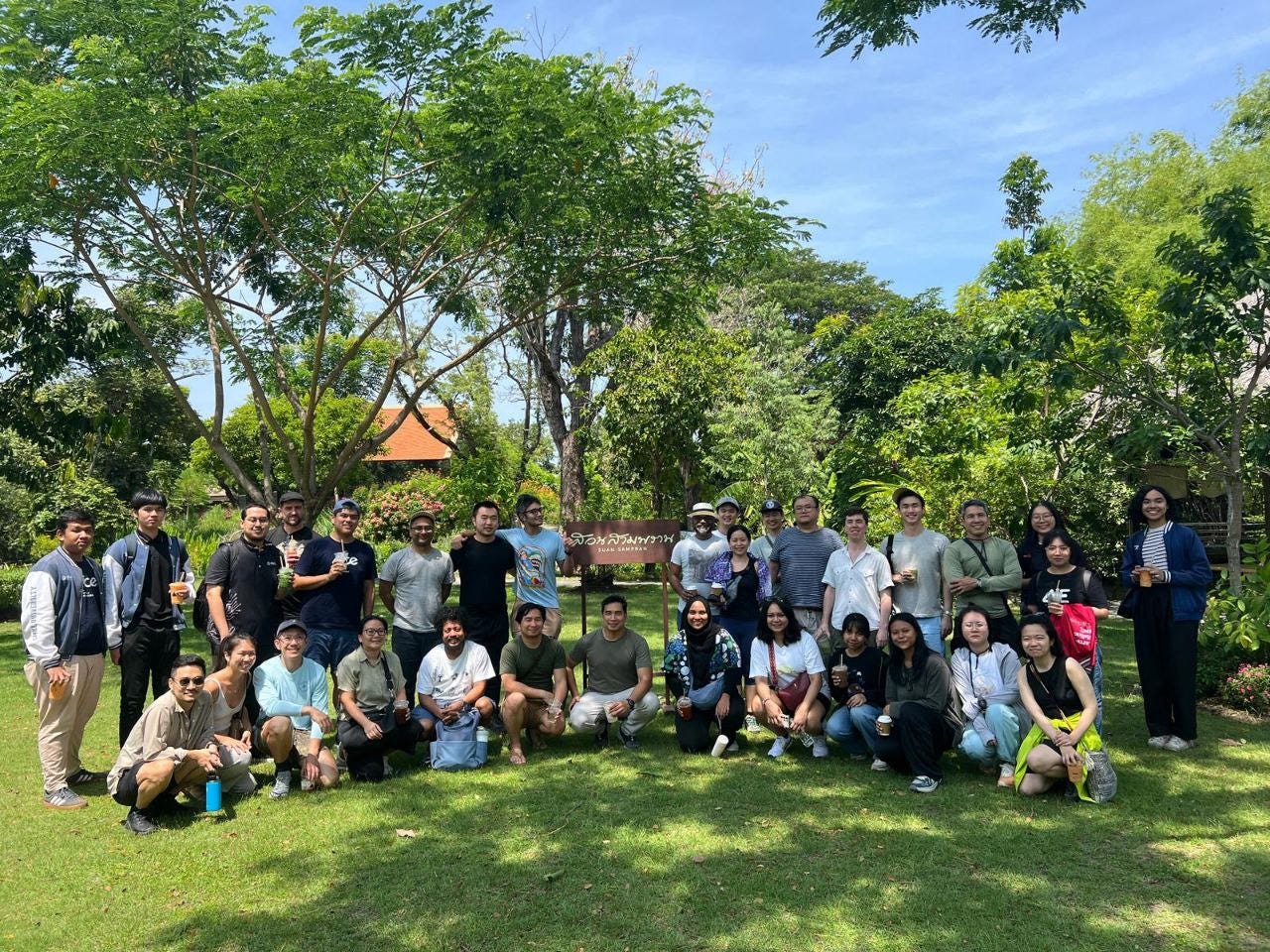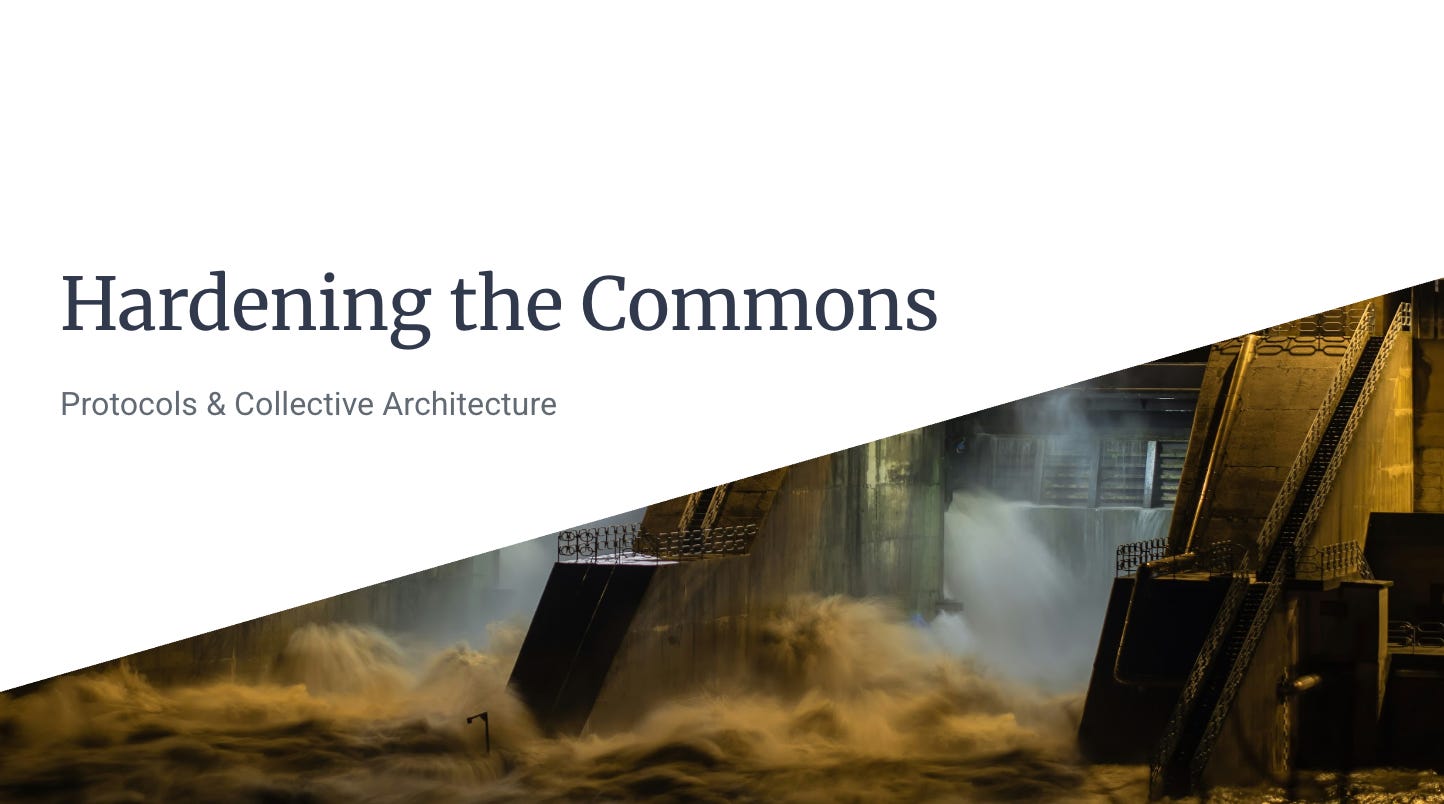In this issue: Highlights from Discord, a seminar on hardened commons, guest talk on public intelligence, sneak peak of the Khlongs and Subaks workshop, next week’s guest talk on AI swarms, and some pieces we’d like to see.
Highlights from the SoP Server
Na continues to experiment with AIs as on-demand tutors, to learn MCP and OpenDER.
“If OpenAI buys Google Chrome, we’re not witnessing a product shift - we're witnessing a protocol war.” - John Grant
Patrick from the Southern California Metropolitan Water District is sharing updates from their protocol-inspired efficiency improvement project, which is running over the summer.
The interesting case of funeral potatoes and spontaneous coordination.
Plenty of new people joining, including artists, tech consultants, law students, authors, and teachers. Have you joined yet?
Rewind: Public Intelligence
On Tuesday, founding Executive Editor of Wired Magazine, Kevin Kelly, joined us to share his thoughts on Public Intelligence. What if we thought about artificial intelligence as public goods like libraries and the internet?
That’s not to say that all AIs should be public. We don’t just have libraries – we have bookstores as well. This variety is a good thing, and worth protecting. Kevin Kelly also floated the idea that if libraries didn’t already exist, publishers might never have let them emerge. If we miss our window to build Public Intelligence, it might never reappear.
Get caught up by rewatching here. You can read Kevin Kelly’s full essay on Public Intelligence here.
Next Week: The Purpose Protocol
Join us Wednesday, April 30th at 9:00am PDT for a talk about protocols for AI agents with former CEO of Twitch and OpenAI, Emmett Shear.
"Collective intelligences are networks of smaller intelligences, acting as a single more-or-less coherent one. To make this work, each smaller agent needs to know what it should be doing, based on its location in the network. In theory this could be decided on an action-by-action basis, based on the entire history of everything the agent has ever observed. In practice, such an approach is monumentally unworkable because the number of such contexts is so high that it's likely this particular one has never been seen before, let alone enough times to learn the optimal policy. The solution to this is the purpose protocol: agents choose from a tree of shared finite set of possible purposes ("roles"), based mostly on the roles selected by nearby network neighbors."
Interested? Add it to your calendar.
K&S Sneak Peek
The Khlongs and Subaks workshop in Bangkok, Thailand, has wrapped up. Participants studied and hacked in line with the overall theme of blockchains and decentralized AI. They heard from Kevin Kelly, who shared his thoughts on Public Intelligence. They visited Thailand’s protocol-ish rice farms and canals. And they even created a series of AI-generated films!
The next major Summer of Protocols event is in Healdsburg (Edge Esmeralda), California. If you’ll be there in Week 1, May 24-31, be sure to stop by to some of our events.
Pieces We’d Like to See
There is a wave of protocol fiction coming your way. April’s contest generated some great stories, several of which we’re looking forward to publishing here. We also have essays in the hopper about concepts like tensions and protocolization theory.
There’s a long wish list of stories, studies and science that we’d like to see. Here are a few, in case you’re feeling ambitious.
A history of protocols in war, from matters of surrender to more complex agreements like the Geneva Conventions.
A summary of the science of protocols for managing the tension between industrial work schedules and circadian rhythms, and/or seasonal affective disorder, titled Protocols for Summer.
A survey of the current landscape of major climate protocols, for e.g., successors to the Montreal and Kyoto Protocols.
A piece on one or more emerging protocols in AI – we already commissioned a deep dive on the Model Context Protocol, which is quickly being adopted in the industry.
A case study on protocols for internal communication between teams or departments in the context of a large organization – what protocols govern communication flows across internal borders and why?
We especially welcome people that don’t identify as a writer – if you’re a hands-on practitioner, we’re happy to support you. LLMs are making it easy for anyone to write, and we’re getting pretty good at AI-assisted writing.
Go here for more detailed guidance on how to write with us.
Slide Deck on Hardened Commons
This week, we gave a virtual seminar at the Southern California Metropolitan Water District (The Met). The topic was hardened commons – a central theme of this year’s research at Summer of Protocols. Interested? Check the slides.
We have limited bandwidth, but do offer pro bono speaking engagements and afternoon workshops. You can find more information, including how to reach us, here.
SoP25 Spotlight
In each new issue of Protocolized, leading up to the kick off of the main track of the 2025 Summer of Protocols, we’ll introduce one of this year’s teaching fellows.
Dr. Vaughn Tan is a Singapore- and Marseille-based researcher and consultant on building strategy for uncertainty. He wrote The Uncertainty Mindset (Columbia Univ. Press, 2020), on using uncertainty as a tool for designing adaptable organizations. Vaughn is a Fellow of the Singapore Government's Centre for Strategic Futures, an executive board member of Rethink Food, and honorary associate professor of strategy at University College London. He has a PhD in Organizational Behavior and Sociology from Harvard University.
Tentative Course Title: Strategy as an organizational coordination protocol for the public sector
⬇️ Issue #14 ⬇️
A Chronicle of Lumina
In this issue: Life aboard a civilizational satellite in Earth’s orbit changes quickly when a new game is introduced. Also – join us, today, April 22nd, at 7pm PDT for a talk on Public Intelligence with Kevin Kelly (details and link below). Quick update on our sci-fi contest.







